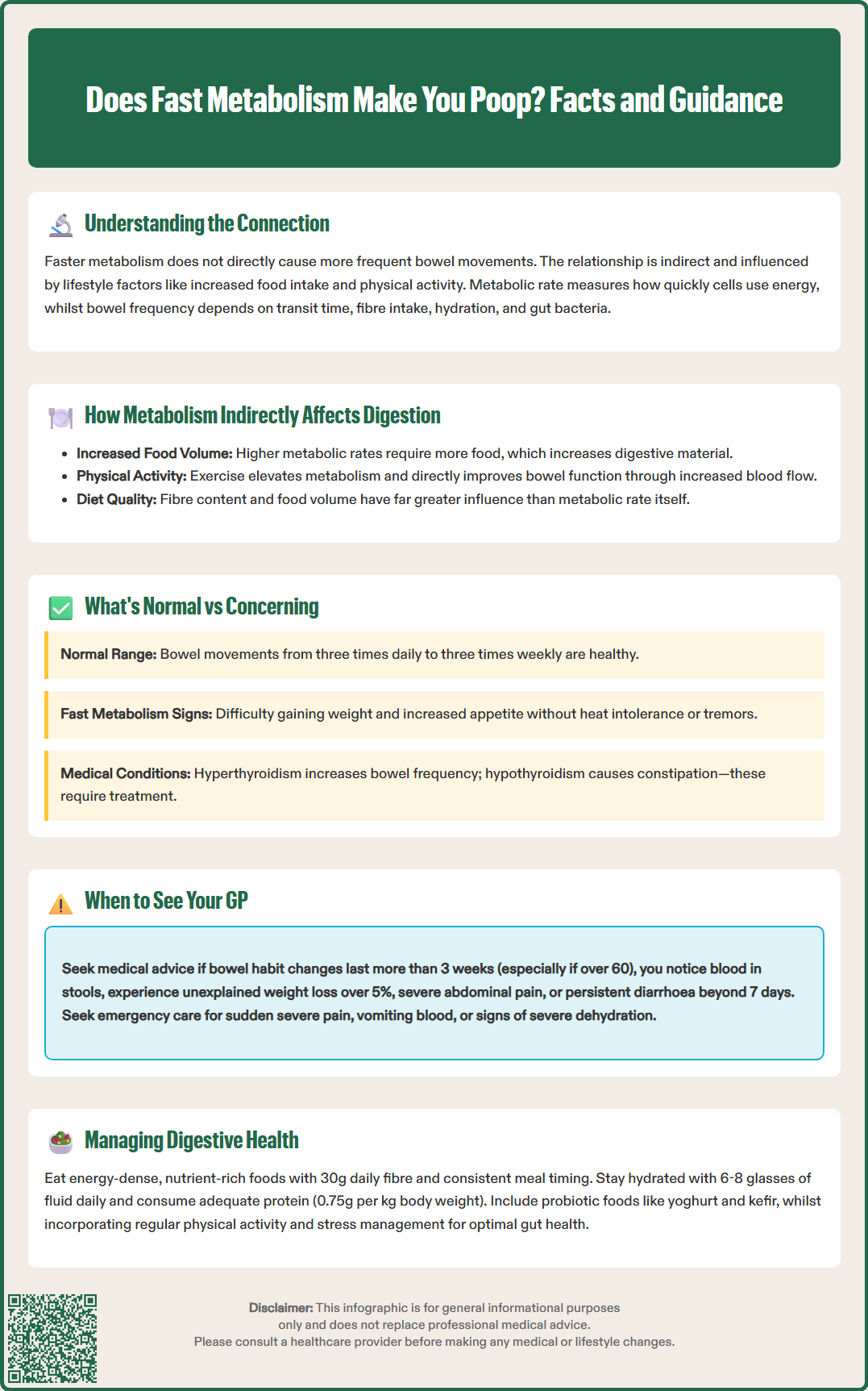
Does a fast metabolism make you poop more frequently? This common question reflects widespread curiosity about the relationship between metabolic rate and bowel habits. Whilst metabolism and digestion are interconnected bodily systems, they operate through distinct physiological mechanisms. Metabolic rate primarily reflects how quickly your cells utilise energy, whereas bowel movement frequency depends on gastrointestinal transit time, dietary fibre intake, hydration, physical activity, and gut microbiota composition. The connection between metabolic rate and bowel frequency is indirect rather than causative. Understanding this distinction helps clarify misconceptions and enables accurate assessment of digestive health concerns.
Quick Answer: A fast metabolism does not directly cause increased bowel movements; the relationship is indirect and influenced by associated lifestyle factors rather than metabolic rate itself.

Mounjaro® is the most innovative GLP-1 medication proven to dramatically curb appetite, hunger, and cravings to help professional men achieve substantial weight loss.
Start Here
Wegovy® is a weekly injectable GLP-1 medication with proven effectiveness in reducing appetite, hunger, and cravings to help busy professionals lose significant weight.
Start HereMetabolism refers to the complex biochemical processes by which your body converts food and drink into energy. This encompasses both catabolism (breaking down molecules to release energy) and anabolism (using energy to build cellular components). Your basal metabolic rate (BMR) represents the energy your body requires at rest to maintain vital functions such as breathing, circulation, and cellular repair.
Digestive function, whilst related to metabolism, operates through distinct physiological mechanisms. The gastrointestinal tract processes food through mechanical and chemical digestion, absorbing nutrients whilst propelling waste material towards elimination. This process, known as gastrointestinal motility, is regulated by the enteric nervous system, hormones, and the gut microbiome.
Whilst metabolism and digestion are interconnected systems, they function through different pathways. Metabolic rate primarily reflects how quickly your cells utilise energy, whereas bowel movement frequency depends on factors including:
Gastrointestinal transit time (how quickly food moves through your digestive system)
Dietary fibre intake and food composition
Hydration status and fluid balance
Physical activity levels
Gut microbiota composition
Hormonal influences and stress responses
The relationship between metabolic rate and bowel habits is indirect rather than causative. Individuals with faster metabolisms may exhibit certain lifestyle patterns—such as higher food intake or increased physical activity—that secondarily influence digestive function. Normal bowel frequency varies considerably between individuals—anywhere from three times daily to three times weekly can be considered normal. Understanding this distinction helps clarify common misconceptions about metabolism's direct effect on bowel movements and enables more accurate assessment of digestive health concerns.

The connection between metabolic rate and bowel movement frequency is indirect and multifactorial rather than a simple cause-and-effect relationship. There is no evidence of a direct causal relationship between baseline metabolic rate and bowel frequency in healthy individuals. However, several associated factors may create this perceived connection.
Individuals with higher metabolic rates typically consume greater quantities of food to meet their increased energy requirements. This elevated food intake naturally results in more digestive material passing through the gastrointestinal tract, potentially leading to more frequent bowel movements. The volume and composition of dietary intake—particularly fibre content—exerts considerably more influence on bowel frequency than metabolic rate itself.
Physical activity, which can elevate metabolic rate, does demonstrate a more direct relationship with bowel function. Exercise stimulates intestinal motility through several mechanisms:
Increased blood flow to the digestive organs
Mechanical stimulation of the intestines through body movement
Hormonal changes that affect gut transit time
Reduced stress, which can improve digestive regularity
While activity generally supports motility and wellbeing, evidence for exercise specifically treating constipation varies in effectiveness between individuals.
Certain conditions associated with elevated metabolism, such as hyperthyroidism, can genuinely increase bowel movement frequency. Excess thyroid hormone accelerates gastrointestinal transit time and can cause diarrhoea or frequent loose stools. This represents a pathological state rather than normal metabolic variation.
Conversely, hypothyroidism (slow metabolism) commonly causes constipation due to reduced intestinal motility. These clinical examples demonstrate that whilst extreme metabolic disturbances can affect bowel habits, normal variations in metabolic rate among healthy individuals have minimal direct impact on defaecation frequency. The perceived association often reflects confounding lifestyle factors rather than metabolic rate itself.
Distinguishing between normal metabolic variation and underlying digestive pathology requires careful attention to symptom patterns and associated features. Some characteristics often associated with a faster metabolism include:
Difficulty maintaining or gaining weight despite adequate food intake
Increased appetite and frequent hunger
It's important to note that symptoms such as heat intolerance, raised body temperature, or unusually high energy levels are not typical features of normal metabolic variation and may suggest thyroid dysfunction requiring medical assessment.
Normal bowel habits vary widely between individuals. A healthy pattern can range from three times daily to three times weekly, provided stools are comfortable to pass and you feel well.
In contrast, digestive conditions warranting medical evaluation often present with:
Persistent diarrhoea (loose or watery stools lasting beyond 7 days)
Blood, mucus, or undigested food visible in stools
Severe abdominal pain, cramping, or bloating
Unintentional weight loss exceeding 5% of body weight
Nocturnal bowel movements disrupting sleep
Fever, fatigue, or systemic symptoms
Rectal bleeding and nocturnal symptoms always warrant prompt medical review.
Irritable bowel syndrome (IBS), affecting up to 1 in 5 UK adults according to NHS estimates, may cause altered bowel habits including increased frequency. However, IBS typically involves abdominal discomfort relieved by defaecation, alongside bloating and alternating bowel patterns. According to NICE guidelines (CG61), diagnosis requires these symptoms for at least 6 months.
Inflammatory bowel disease (IBD), including Crohn's disease and ulcerative colitis, presents with more severe symptoms: bloody diarrhoea, significant weight loss, and extraintestinal manifestations. Coeliac disease may cause frequent bowel movements alongside malabsorption symptoms when gluten is consumed.
Hyperthyroidism deserves particular consideration when increased bowel frequency accompanies weight loss despite increased appetite, tremor, palpitations, or anxiety. Thyroid function tests provide definitive diagnosis. If bowel habit changes represent a departure from your normal pattern or occur with concerning features, medical assessment is essential to exclude underlying pathology rather than attributing symptoms solely to metabolic rate.
Understanding when bowel habit changes require professional evaluation is crucial for timely diagnosis and management. Contact your GP promptly if you experience:
Persistent change in bowel habit lasting more than 3 weeks, particularly if you're over 60 years old
Blood in stools (whether bright red or dark, tar-like melaena), particularly if you're over 50
Unexplained weight loss of more than 5% body weight over 3-6 months
Severe or persistent abdominal pain
A lump or mass in your abdomen
Extreme fatigue or breathlessness (potential anaemia)
Diarrhoea persisting beyond 7 days
The NHS advises immediate medical attention (A&E or 999) for:
Sudden, severe abdominal pain
Vomiting blood or coffee-ground material
Passing large amounts of dark or black stools
Signs of severe dehydration (dizziness, reduced urination, confusion)
NICE guidance (NG12) on suspected cancer recognition emphasises that certain symptom combinations warrant urgent specialist referral within 2 weeks. These include unexplained rectal bleeding in adults aged 50 and over, unexplained change in bowel habit in those aged 60 and over, or unexplained weight loss combined with abdominal pain in those over 40.
For individuals without alarm features, persistent bowel habit changes still merit routine GP assessment. Your doctor will conduct a thorough history, physical examination, and may arrange investigations including:
Blood tests (full blood count, inflammatory markers, coeliac serology, thyroid function)
Stool samples (faecal calprotectin for inflammation, culture for infection)
Faecal immunochemical testing (FIT) to help assess risk of colorectal cancer
Referral for endoscopy if clinically indicated
Unexplained iron-deficiency anaemia, particularly in men and postmenopausal women, is an important red flag that requires investigation.
Don't delay seeking advice due to embarrassment—bowel symptoms are common presentations that GPs assess daily. Early evaluation enables appropriate investigation, excludes serious pathology, and provides reassurance or treatment as needed. Keeping a symptom diary recording bowel frequency, stool consistency (using the Bristol Stool Chart), associated symptoms, and dietary intake helps your GP make accurate assessments.
Maintaining optimal digestive health when you have a naturally fast metabolism involves strategic dietary and lifestyle approaches that support both energy requirements and gastrointestinal function.
Nutritional strategies should focus on:
Adequate caloric intake: Consume sufficient energy-dense, nutrient-rich foods to maintain healthy body weight. Include nuts, avocados, olive oil, and whole grains.
Balanced fibre consumption: Aim for 30g daily fibre from varied sources (fruits, vegetables, wholegrains, legumes) to promote regular, formed bowel movements without excessive frequency, as recommended in the NHS Eatwell Guide.
Regular meal patterns: Eating at consistent times helps regulate digestive function and may help maintain stable blood glucose levels.
Adequate protein: Consume around 0.75g per kilogram body weight daily for most healthy adults, as per UK recommendations. Higher intakes may be appropriate for very active individuals, older adults, or under dietitian guidance.
Hydration: Drink 6-8 glasses (1.5-2 litres) of fluid daily, adjusting for activity levels and climate, as advised by the NHS.
Lifestyle modifications that support digestive health include:
Regular physical activity: Whilst exercise increases metabolic rate, it also promotes healthy gut motility and reduces stress-related digestive symptoms.
Stress management: Chronic stress affects gut-brain axis communication, potentially altering bowel habits. Consider mindfulness, adequate sleep (7-9 hours nightly), and relaxation techniques.
Probiotic foods: Fermented foods like yoghurt, kefir, and sauerkraut may support beneficial gut microbiota. Evidence varies, but NICE guidance allows a trial of probiotics for up to 4 weeks in conditions like IBS.
Avoid potential triggers:
Excessive caffeine, which stimulates bowel motility
Artificial sweeteners (sorbitol, mannitol) that can cause osmotic diarrhoea
Highly processed foods lacking nutritional density
If you're struggling to maintain weight despite high food intake, or if frequent bowel movements interfere with daily activities, consult your GP. They can assess for underlying conditions, provide personalised dietary advice, or refer you to a registered dietitian. Remember that normal bowel frequency varies considerably between individuals—anywhere from three times daily to three times weekly can be normal, provided stools are comfortable to pass and you feel well.
No, metabolic rate does not directly cause increased bowel movements. The connection is indirect—people with faster metabolisms often consume more food, which increases digestive material and may lead to more frequent bowel movements through volume rather than metabolic rate itself.
Normal bowel frequency varies considerably between individuals, ranging from three times daily to three times weekly. Provided stools are comfortable to pass and you feel well, this variation is considered normal and does not necessarily indicate a problem.
Contact your GP if bowel habit changes persist for more than three weeks, especially if you're over 60, or if you experience blood in stools, unexplained weight loss exceeding 5% of body weight, severe abdominal pain, or diarrhoea lasting beyond seven days.
All medical content on this blog is created based on reputable, evidence-based sources and reviewed regularly for accuracy and relevance. While we strive to keep content up to date with the latest research and clinical guidelines, it is intended for general informational purposes only.
DisclaimerThis content is not a substitute for professional medical advice, diagnosis, or treatment. Always consult a qualified healthcare professional with any medical questions or concerns. Use of the information is at your own risk, and we are not responsible for any consequences resulting from its use.